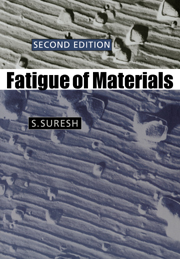Book contents
- Frontmatter
- Contents
- Preface to the second edition
- Preface to the first edition
- 1 Introduction and overview
- PART ONE CYCLIC DEFORMATION AND FATIGUE CRACK INITIATION
- PART TWO TOTAL-LIFE APPROACHES
- 7 Stress–life approach
- 8 Strain–life approach
- PART THREE DAMAGE-TOLERANT APPROACH
- PART FOUR ADVANCED TOPICS
- Appendix
- References
- Author index
- Subject index
7 - Stress–life approach
Published online by Cambridge University Press: 05 June 2012
- Frontmatter
- Contents
- Preface to the second edition
- Preface to the first edition
- 1 Introduction and overview
- PART ONE CYCLIC DEFORMATION AND FATIGUE CRACK INITIATION
- PART TWO TOTAL-LIFE APPROACHES
- 7 Stress–life approach
- 8 Strain–life approach
- PART THREE DAMAGE-TOLERANT APPROACH
- PART FOUR ADVANCED TOPICS
- Appendix
- References
- Author index
- Subject index
Summary
The preceding chapters were concerned with the evolution of permanent damage under cyclic deformation and with the attendant nucleation of a fatigue crack. While these discussions pertain to micromechanical processes, phenomenological continuum approaches are widely used to characterize the total fatigue life as a function of such variables as the applied stress range, strain range, mean stress and environment. These stress- or strain-based methodologies, to be examined in Part Two, embody the damage evolution, crack nucleation and crack growth stages of fatigue into a single, experimentally characterizable continuum formulation. In these approaches, the fatigue life of a component is defined as the total number of cycles or time to induce fatigue damage and to initiate a dominant fatigue flaw which is propagated to final failure. The philosophy underlying the cyclic stress-based and strain-based approaches is distinctly different from that of defect-tolerant methods to be considered in Part Three, where the fatigue life is taken to be only that during which a pre-existing fatigue flaw of some initial size is propagated to a critical size.
The stress–life approach to fatigue was first introduced in the 1860s by Wöhler. Out of this work evolved the concept of an ‘endurance limit’, which characterizes the applied stress amplitude below which a (nominally defect-free) material is expected to have an infinite fatigue life.
- Type
- Chapter
- Information
- Fatigue of Materials , pp. 221 - 255Publisher: Cambridge University PressPrint publication year: 1998
- 1
- Cited by

